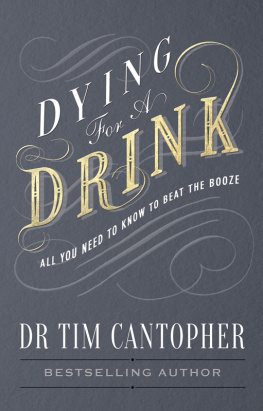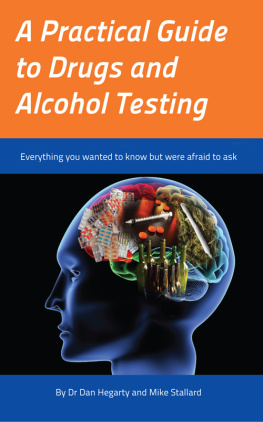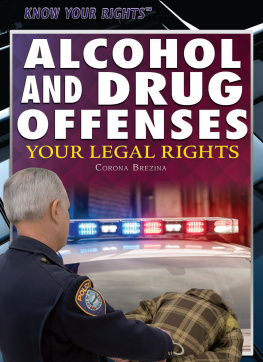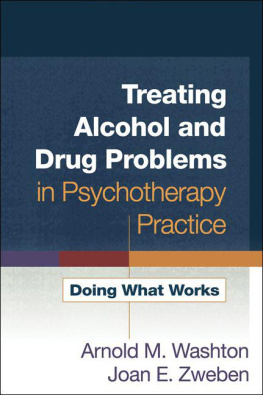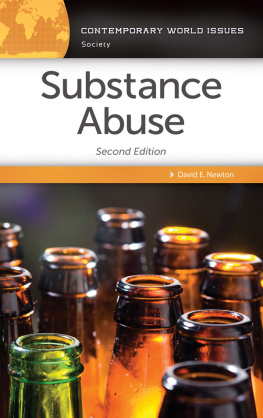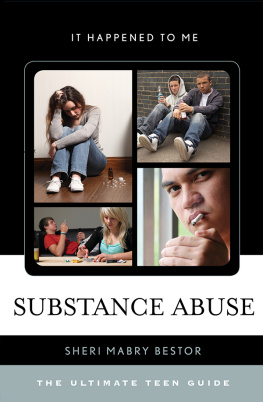Social Work with Drug, Alcohol and Substance Misusers
Social Work with Drug, Alcohol and Substance Misusers
THIRD EDITION
ANTHONY GOODMAN
Series Editors: Jonathan Parker and Greta Bradley
Learning Matters
An imprint of SAGE Publications Ltd
1 Olivers Yard
55 City Road
London EC1Y 1SP
SAGE Publications Inc.
2455 Teller Road
Thousand Oaks, California 91320
SAGE Publications India Pvt Ltd
B 1/I 1 Mohan Cooperative Industrial Area
Mathura Road
New Delhi 110 044
SAGE Asia-Pacific Pte Ltd
3 Church Street
#10-04 Samsung Hub
Singapore 049483
Editor: Luke Block
Development editor: Kate Lodge
Production controller: Chris Marke
Project management: Deer Park Productions, Tavistock, Devon
Marketing manager: Tamara Navaratnam
Cover design: Wendy Scott
Typeset by: PDQ Typesetting Ltd
Printed and bound by CPI Group (UK) Ltd, Croydon, CR0 4YY
2013 Anthony Goodman
First edition published in 2007 by Learning Matters.
Reprinted in 2007
Second edition published in 2009
Reprinted in 2010
Third edition published in 2013 by SAGE/Learning Matters
Apart from any fair dealing for the purposes of research or private study, or criticism or review, as permitted under the Copyright, Designs and Patents Act, 1988, this publication may be reproduced, stored or transmitted in any form, or by any means, only with the prior permission in writing of the publishers, or in the case of reprographic reproduction, in accordance with the terms of licences issued by the Copyright Licensing Agency. Enquiries concerning reproduction outside those terms should be sent to the publishers.
Professional Capabilities Framework diagram reproduced with permission of The College of Social Work.
Library of Congress Control Number: 2013946209
British Library Cataloguing in Publication data
A catalogue record for this book is available from the British Library
ISBN 978 1 4462-6759-2 (pbk)
ISBN 978 1 4462-6758-5
Contents
Acknowledgements
My interest in working with substance misusers started when I was a probation officer, learning how to engage positively with this challenging client group. I have worked with many social work and criminology students over the years at Middlesex University and have enjoyed and learnt from the discussions on this topic. It has also been interesting to work with students on the Advanced Modern Apprenticeship and Progression Award in substance misuse. Anecdotally, motivational interviewing and an understanding of how people can change have been well received by these students.
I would like to thank the people who have assisted me with the ideas for the book, including Fran Barry, Raj Hira, Jenni Lowe, Betsy Thom, Susanne MacGregor, and Ruth Houghton, librarian at Middlesex University. I am of course responsible for any inaccuracies.
I have had great support and advice from Kate Lodge at Learning Matters and Jonathan Parker, series editor: many thanks.
Finally, I would like to dedicate this book to Sue.
Introduction
This book is written for student social workers who are developing their skills and understanding of the requirements for practice. It is also designed for practitioners and others who are interested in how practice is changing in the field of working with substance misusers. It will encourage the student or experienced practitioner to consider engagement with hard-to-reach clients who may be very ambivalent about changing their behaviour. The social work profession adheres to a set of values and is committed to client self-determination. Nevertheless there are techniques that can be successfully employed to positively challenge clients to examine and change their behaviour and lifestyle. The area of substance misuse has been somewhat ignored by the social work profession and this gap has only been more recently acknowledged. Interest in alcohol misuse is even more recent, perhaps due to its legality and common usage. Why this should be the case is unclear, but perhaps it was because the problems of substance misusers were seen as self-inflicted or that they were a low priority.
Requirements for social work education
This book will help students to learn about working with clients who are drug and alcohol and substance misusers. Social workers will meet clients with these issues whatever area of practice they go into, so ignoring this area of practice can no longer be considered an option.
The book will also help meet the Quality Assurance Agency benchmarks for social work, including:
- social work services and service users;
- values and ethics;
- social work theory; and
- the nature of social work practice.
The National Occupational Standards set for social workers are covered and the book addresses the importance of working with individuals, carers, groups and communities. Furthermore, in the language of the Standards:
- prepare for and work with the above;
- plan, carry out review and evaluate social work practice;
- manage risk;
- manage and be accountable, with supervision and support, for ones own practice; and
- demonstrate professional competence in social work practice.
What is substance misuse?
Abusing drugs can apply to legal or illegal substances, and they can be taken in a wide variety of ways to get them into the bloodstream. DrugScope comment that addiction refers to the situation whereby most of the persons life is taken over by the need to obtain and consume drugs. They helpfully remind us that words like addict or junkie carry with them a negative connotation and they are a powerful label. It is better to call a person drug dependent, where dependency is the compulsion to keep taking drugs. Dependency can be physical or psychological or both. In the former case Drug-Scope points out that heavy use of drugs like alcohol, heroin or tranquillisers changes the body chemistry so that withdrawal of the drug causes symptoms that can be very severe and requires more of the drug or supportive withdrawal under medical supervision. Gossop (2003), conversely, while acknowledging that the terms addiction and addict can carry a social stigma, believes that the terms are useful (indeed he uses them throughout his book) as they signify the loss of power and freedom felt by the substance misuser.
Alcohol is a drug that is called a depressant. This is due to its effect on the body rather than to the personality. It slows down the brain and the central nervous system. Alcohol gets absorbed into the bloodstream and then is broken down by the liver. People can become more tolerant to alcohol but not to the physical and psychological damage that excessive consumption creates. This can be permanent, and high-profile cases, like the footballer George Best who needed a liver transplant, demonstrate the damage this drug can cause. The general guidance is that men should drink no more than 21 units per week and women 14 units (a unit is approximately equivalent to a glass of wine or half a pint of not too strong beer). More recently the advice has changed and people are advised to have some dry days each week to give the liver time to recover.







